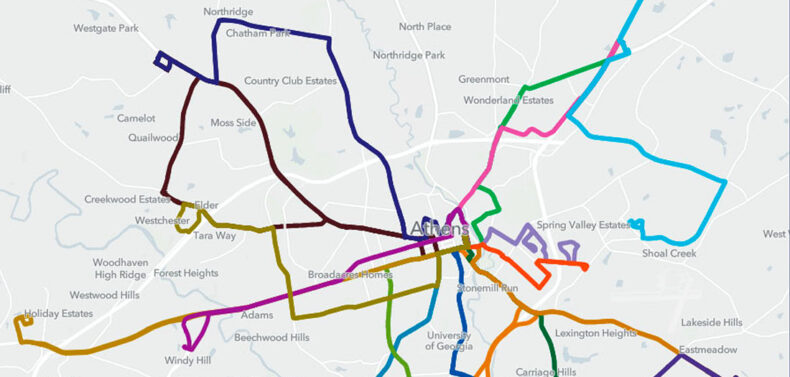A microtransit service for rural neighborhoods and a bus line to Atlanta are among the improvements Athens Transit officials are floating to county commissioners in a new long-range plan.
The transit development plan is updated every five years, and the latest version will come before the Athens-Clarke County Commission on Apr. 1. Transit officials developed the plan after holding public hearings, meetings with stakeholders and releasing a survey, receiving 1,450 comments.
“We found there is a strong drive for more frequent service, and also expansion of service to new areas,” Athens Transit Director Victor Pope told the Athens-Clarke County Commission at a Feb. 11 work session. “We also learned that cost is indeed an important factor.”
Residents also said their priorities include access to schools, jobs and recreation, creating partnerships with other transit agencies, maintaining safety, exploring new revenue sources, shorter travel times and connecting major corridors. “All groups prioritized more frequent service and service to new areas, pretty definitively,” according to transit consultant Beth Hoffman.
That will cost money, if the commission does pursue any of those ideas. Transit officials expect to receive $221 million over the next 10 years, about half of it from the federal government—primarily capital funds to purchase new buses—and half from the local government in the form of TSPLOST, the voter-approved 1% local sales tax for transportation, which can be used for operating costs. A small portion comes from the state and other sources like advertising.
The ACC government no longer pays for transit through the general fund (property taxes) and stopped charging fares during the COVID-19 pandemic. Commissioners did not discuss it at last week’s work session, but in the past some have suggested renewing fares and/or general fund contributions in order to expand service. However, charging fares could depress ridership, and would incur overhead costs like reinstalling fareboxes and printing tickets.
One of the ideas put forward in the transit development plan is microtransit outside the Loop, where density is too low to provide fixed-route service efficiently. It is an “on-demand model that allows service to be provided to areas that are a little less dense in a more efficient way,” according to Hoffman. The more rural parts of the county would be divided into three zones, with vans circulating through each. They would stop at regular stops, but residents could also call ahead and have a van come pick them up within 30 minutes.
When fully implemented, the three zones would cover an area of 52 square miles that includes about 52,000 people and 18,000 jobs. It would cost $2.6 million per year to operate.
Another idea is an “employment shuttle” running from downtown to a future transfer station planned as part of the Georgia Square Mall redevelopment or possibly the Caterpillar plant, which would cost about $75,000 a year to operate. Some commissioners also expressed interest in a similar shuttle to manufacturing plants in the Olympic Drive area.
Running a bus to the Doraville MARTA station seven times a day would run the county about $300,000 a year. Commissioner Melissa Link said that such a service might mean that UGA students don’t need to bring their cars with them.
ACC received a $600,000 grant from the Georgia Department of Transportation in 2023 to test a bus line to Lawrenceville. That pilot project was scuttled, though, when Gwinnett County voters rejected a TSPLOST proposal in November that included an express bus from Lawrenceville to Doraville, Mayor Kelly Girtz told Flagpole. Girtz said he plans to approach Gwinnett officials about finding another source of funding on their end. “Is there some other way we can collaborate?” he said.
Commissioner Carol Myers said she would like to explore extending transit service to Epps Bridge Parkway in Oconee County so that Athens residents can access shopping and health care. “We received considerable feedback that people would love to see that,” Pope responded. “What I see in the future is definitely a much more blurred line as to where Athens stops and the neighboring county begins”
However, it would require an intergovernmental agreement with Oconee County to install bus stops. And based on feedback from the Northeast Georgia Regional Commission, a 12-county regional planning agency, there is not much interest in transit from other counties, Pope said. “I think that you all are ahead of where some of our neighbors are as far as understanding the transportation needs of the community and the region as a whole,” he said.
The transit development plan also includes proposals for tweaking the existing fixed bus routes, although Pope told Flagpole that it’s important to note that the maps in the plan are not set in stone. The county could go with a “high coverage” map that serves more areas, or a “high frequency” map that focuses more on improving service in the areas where the most transit riders live—primarily along Broad Street, Baxter Street and Lexington Road.
Besides operations, Athens Transit also faces future capital expenses. Hybrid buses purchased in 2018 now have 250,000 miles on them and need their engines replaced, Pope said. If ACC ever wants to use electric buses, it will require a new bus depot because there is no space at the current Pound Street facility for chargers. The county has bought land off Olympic Drive for a new bus depot, but constructing it will cost about $45 million to $50 million, according to Pope. He said a new depot in Greenville, SC cost $43 million.
The transit development plan is available at accgov.com/2172/Athens-Transit-Development-Plan, and public comments are being accepted through Mar. 4.
Like what you just read? Support Flagpole by making a donation today. Every dollar you give helps fund our ongoing mission to provide Athens with quality, independent journalism.










